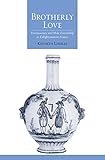Brotherly Love : Freemasonry and Male Friendship in Enlightenment France / Kenneth B. Loiselle.
Material type: TextPublisher: Ithaca, NY : Cornell University Press, [2014]Copyright date: ©2014Description: 1 online resource (280 p.) : 4 halftones, 1 line drawing, 4 tablesContent type:
TextPublisher: Ithaca, NY : Cornell University Press, [2014]Copyright date: ©2014Description: 1 online resource (280 p.) : 4 halftones, 1 line drawing, 4 tablesContent type: - 9780801454875
- Enlightenment -- France
- Enlightenment -- France
- Freemasonry -- History -- 18th century -- France
- Freemasonry -- France -- History -- 18th century
- Male friendship -- History -- 18th century -- France
- Male friendship -- France -- History -- 18th century
- Europe
- History
- HISTORY / Europe / France
- masonic lodge, eighteenth century friendship, enlightenment sociability, private sphere formation, egalitarian friendship, male relationships in history
- 366.1094409033 23
- HS603 .L65 2016
- online - DeGruyter
| Item type | Current library | Call number | URL | Status | Notes | Barcode | |
|---|---|---|---|---|---|---|---|
 eBook
eBook
|
Biblioteca "Angelicum" Pont. Univ. S.Tommaso d'Aquino Nuvola online | online - DeGruyter (Browse shelf(Opens below)) | Online access | Not for loan (Accesso limitato) | Accesso per gli utenti autorizzati / Access for authorized users | (dgr)9780801454875 |
Browsing Biblioteca "Angelicum" Pont. Univ. S.Tommaso d'Aquino shelves, Shelving location: Nuvola online Close shelf browser (Hides shelf browser)

|

|

|

|

|

|

|
||
| online - DeGruyter Songs of the Factory : Pop Music, Culture, and Resistance / | online - DeGruyter Northern Men with Southern Loyalties : The Democratic Party and the Sectional Crisis / | online - DeGruyter What Galileo Saw : Imagining the Scientific Revolution / | online - DeGruyter Brotherly Love : Freemasonry and Male Friendship in Enlightenment France / | online - DeGruyter Orchids of Tropical America : An Introduction and Guide / | online - DeGruyter Dangerous Guests : Enemy Captives and Revolutionary Communities during the War for Independence / | online - DeGruyter "Who, What Am I?" : Tolstoy Struggles to Narrate the Self / |
Frontmatter -- Contents -- Acknowledgments -- List of Abbreviations -- Introduction -- 1. The Masonic Utopia of Friendship -- 2. Friendship in Ritual -- 3. Confronting the Specter of Sodomy -- 4. “New but True Friends”: The Friendship Network of Philippe-Valentin Bertin du Rocheret -- 5. Friendship in the Age of Sensibility -- 6. Friendship under Fire: Freemasonry in the French Revolution -- Conclusion -- Index
restricted access online access with authorization star
http://purl.org/coar/access_right/c_16ec
Friendship, an acquired relationship primarily based on choice rather than birth, lay at the heart of Enlightenment preoccupations with sociability and the formation of the private sphere. In Brotherly Love, Kenneth Loiselle argues that Freemasonry is an ideal arena in which to explore the changing nature of male friendship in Enlightenment France. Freemasonry was the largest and most diverse voluntary organization in the decades before the French Revolution. At least fifty thousand Frenchmen joined lodges, the memberships of which ranged across the social spectrum from skilled artisans to the highest ranks of the nobility. Loiselle argues that men were attracted to Freemasonry because it enabled them to cultivate enduring friendships that were egalitarian and grounded in emotion.Drawing on scores of archives, including private letters, rituals, the minutes of lodge meetings, and the speeches of many Freemasons, Loiselle reveals the thought processes of the visionaries who founded this movement, the ways in which its members maintained friendships both within and beyond the lodge, and the seemingly paradoxical place women occupied within this friendship community. Masonic friendship endured into the tumultuous revolutionary era, although the revolutionary leadership suppressed most of the lodges by 1794. Loiselle not only examines the place of friendship in eighteenth-century society and culture but also contributes to the history of emotions and masculinity, and the essential debate over the relationship between the Enlightenment and the French Revolution.
Mode of access: Internet via World Wide Web.
In English.
Description based on online resource; title from PDF title page (publisher's Web site, viewed 26. Apr 2024)


